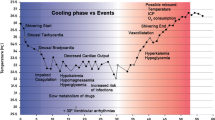Abstract
Moderate hypothermia may reduce mortality in malignant brain infarction. However, due to the extremely limited number of patients treated, it is still unknown whether it may be beneficial if undertaken several days after acute stroke, when the probability of a malignant oedema is higher. We report on a patient with malignant brain oedema after middle cerebral artery infarction, who was treated with moderate hypothermia on the third day after stroke when he became comatose. Hypothermia was induced at a rate of 1.25°C/h by an intravascular cooling catheter. The target temperature of 32°C was reached in about 6 h. After 36 h of hypothermia, the patient was actively re-warmed at a rate of 0.2°C/h. The patient survived and showed a progressive reduction of mass effect on CT scan. This single case study suggests a beneficial effect of hypothermia in the treatment of severe space-occupying ischemic infarction even on the third day after stroke onset.

Similar content being viewed by others
References
Vahedi K, Hofmeijer J, Juettler E et al (2007) Early decompressive surgery in malignant infarction of the middle cerebral artery: a pooled analysis of three randomised controlled trials. Lancet Neurol 6:215–222
Schwab S (2005) Therapy of severe ischemic stroke: breaking the conventional thinking. Cerebrovasc Dis 20(Suppl 2):169–178
Steiner T, Friede T, Aschoff A, Schellinger PD, Schwab S, Hacke W (2001) Effect and feasibility of controlled rewarming after moderate hypothermia in stroke patients with malignant infarction of the middle cerebral artery. Stroke 32:2833–2835
Schwab S, Georgiadis D, Berrouschot J, Schellinger PD, Graffagnino C, Mayer SA (2001) Feasibility and safety of moderate hypothermia after massive hemispheric infarction. Stroke 32:2033–2035
Georgiadis D, Schwarz S, Aschoff A, Schwab S (2002) Hemicraniectomy and moderate hypothermia in patients with severe ischemic stroke. Stroke 33:1584–1588
Schwab S, Schwarz S, Spranger M, Keller E, Bertram M, Hacke W (1998) Moderate hypothermia in the treatment of patients with severe middle cerebral artery infarction. Stroke 29:2461–2466
Huttner HB, Schwab S (2009) Malignant middle cerebral artery infarction: clinical characteristics, treatment strategies, and future perspectives. Lancet Neurol 8:949–958
van der Worp HB, Sena ES, Donnan GA, Howells DW, Macleod MR (2007) Hypothermia in animal models of acute ischaemic stroke: a systematic review and meta-analysis. Brain 130:3063–3074
Colbourne F, Corbett D, Zhao Z, Yang J, Buchan AM (2000) Prolonged but delayed postischemic hypothermia: a long-term outcome study in the rat middle cerebral artery occlusion model. J Cereb Blood Flow Metab 20:1702–1708
Greer DM, Funk SE, Reaven NL, Ouzounelli M, Uman GC (2008) Impact of fever on outcome in patients with stroke and neurologic injury: a comprehensive meta-analysis. Stroke 39:3029–3035
Georgiadis D, Schwarz S, Kollmar R, Schwab S (2001) Endovascular cooling for moderate hypothermia in patients with acute stroke: first results of a novel approach. Stroke 32:2550–2553
Schwab S, Schwarz S, Bertram M, Spranger M, Hacke W (1999) Moderate hypothermia for the treatment of malignant middle cerebral artery infarct. Nervenarzt 70:539–546
Steiner T, Ringleb P, Hacke W (2001) Treatment options for large hemispheric stroke. Neurology 57:S61–S68
Lyden PD, Krieger D, Yenari M, Dietrich WD (2006) Therapeutic hypothermia for acute stroke. Int J Stroke 1:9–19
Lyden PD, Allgren RL, Ng K et al (2005) Intravascular cooling in the treatment of stroke (ICTuS): early clinical experience. J Stroke Cerebrovasc Dis 14:107–114
Kasner SE, Demchuk AM, Berrouschot J et al (2001) Predictors of fatal brain oedema in massive hemispheric ischemic stroke. Stroke 32:2117–2123
Author information
Authors and Affiliations
Corresponding author
Rights and permissions
About this article
Cite this article
Di Lazzaro, V., Profice, P., Dileone, M. et al. Delayed hypothermia in malignant ischaemic stroke. Neurol Sci 33, 661–664 (2012). https://doi.org/10.1007/s10072-011-0824-9
Received:
Accepted:
Published:
Issue Date:
DOI: https://doi.org/10.1007/s10072-011-0824-9




